From Hawaii to the Netherlands and France to South Korea readers have shared their reactions to recent record temperatures
In
mid-July last year, Haythem Ayari, a 23-year-old engineering student in
Nabeul, coastal Tunisia, caught a bus to travel the 10km to university.
The vehicle, already overloaded with passengers, was caught in
gridlocked traffic and sat static for nearly an hour. There was a
heatwave, with a temperature of about 38C (100F) outside; inside the bus
it was 42C (108F). “At a specific moment, I just snapped,” remembered
Ayari. “I got out in the middle of traffic to finally breathe.” Since
then, he has been inclined to panic attacks if in confined, crowded
spaces during hot weather.
A month earlier, approximately 2,000 km (1300 miles) away in Bristol, UK, Adam Corner was on a bus with his partner and their new baby, heading across the city to visit friends. The bus was held up in traffic – not for long, but long enough. “It became a kind of inferno,” said Dr Corner, research director at Climate Outreach; their baby, barely a month old, started screaming in a way Corner had never heard before. “We had a little insight into this immediate, visceral risk – you see it through the eyes of your newborn child.” He pulled the bus’s emergency cord and they jumped off into traffic.
This tale of two bus journeys tells a story of rising temperatures and the pressure they are putting on cities and the people who live in them. Asked by Guardian Cities to share their experiences for a week-long series on urban heat, readers from countries as disparate as Hawaii, the Netherlands, Australia, Denmark, Japan, France, Malaysia, Romania, South Korea and Canada expressed concern about the impacts already being felt.
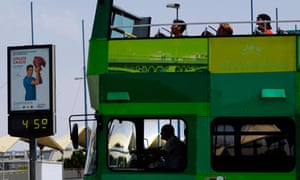
A month earlier, approximately 2,000 km (1300 miles) away in Bristol, UK, Adam Corner was on a bus with his partner and their new baby, heading across the city to visit friends. The bus was held up in traffic – not for long, but long enough. “It became a kind of inferno,” said Dr Corner, research director at Climate Outreach; their baby, barely a month old, started screaming in a way Corner had never heard before. “We had a little insight into this immediate, visceral risk – you see it through the eyes of your newborn child.” He pulled the bus’s emergency cord and they jumped off into traffic.
This tale of two bus journeys tells a story of rising temperatures and the pressure they are putting on cities and the people who live in them. Asked by Guardian Cities to share their experiences for a week-long series on urban heat, readers from countries as disparate as Hawaii, the Netherlands, Australia, Denmark, Japan, France, Malaysia, Romania, South Korea and Canada expressed concern about the impacts already being felt.

“When I moved here many years ago, we used to joke: ‘This summer happened on a Wednesday in Paris’,” wrote Mariann Gyorke. “That’s not the case anymore.” In an effort to preserve the cooler temperatures inside her family’s top-floor apartment, she had been cooking only cold dishes and shielding the windows with makeshift shutters made of cardboard.
Around the world, people altered their behaviour and adapted their schedules to cope with the heatwave. In order to sleep, Michele Howie of Sydney soaked her nightwear in water and lay on a towel in front of two fans. Anna Mastersson in Mariehamn, of Finland’s Åland Islands, said her relative had been forced to buy a new car with air conditioning and a roof window: “In this weather and having to drive two small kids, she had no choice.” In her neighbourhood, dogs were being taken out later at night, for shorter walks. In Montreal, Frederic Hore had noticed people lingering in pedestrian passageways of the metro station to catch the pulse of cool air created by passing trains.
"It’s wonderful not moaning about the weather"
Outside, green spaces dried up, with follow-on effects for agriculture and often the economy. Inge Kersten wrote of Nijmegen, this year’s European Green Capital, “Leaves are falling in our lovely green city”. On her family’s organic farm near Aarhus, Denmark, Jessica Tamminga had watched fields turn from green to brown: “The trees are turning yellow like it’s fall”. But for the impact on her business, she said, the heat was “rather pleasant – except for the disconcerting feeling that this California summer doesn’t belong in Scandinavia.”
Britons, in particular, seemed more ready to take the warmer temperatures at face value. “We’re all enjoying a real summer at last,” wrote Regan Armitage. “Everyone seems uncharacteristically happy in Leeds.” Frank Holt in Brighton described the summer as “luxuriating, joyful, a little alcoholic, a summer you don’t need to go away for”. “It’s wonderful not moaning about the weather,” he wrote, adding that the Guardian’s call-out had seem “designed to gain negative replies”.
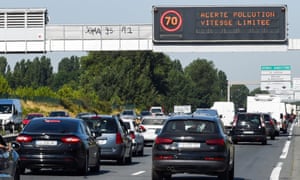
Holt expanded to Guardian Cities by phone that, though he was concerned by climbing temperatures, he felt the onus was on scientists and the media to persuade politicians to act, he said; in the meantime, the warmer weather “did have some enjoyable aspects”. “I think things sometimes should be enjoyed for what they are. This summer has been very good for Brighton.”
"If it gets much hotter I don’t see how the place will be survivable in summer"
And not all life was suffering in the heat. Jellyfish numbers had increased in the tropical seas around Jeju Island, wrote In-Gyum Kim from Seogwipo, its second-largest city. Helena in Columbia, South Carolina, said that judgin gby how often she was bitten, ticks and mosquitoes seemed to be thriving, as were “our famous Palmetto bugs” – cockroaches. In Kuala Lumpur, a bumper crop of the prized durian fruit saw prices come down to RM5 (£1) per kilo – but that had its own, unusual effect.
The fruit is understood to raise the body’s temperature, said Vanessa Ting, a student in the Malaysian capital. “I ate three pieces and spent the rest of the day sweaty and uncomfortable, despite taking six showers.” At the pharmacy where she works part time, more customers had been reporting fevers, sore throats and coughs, attributed variously to the weather and durian. And she’d observed more retirees opting to meet at the McDonald’s where she regularly studied, rather than in more traditional coffee shops without air conditioning.

Cody Winchester had noticed more air conditioners being installed on more buildings in Honolulu. “People used to just open their windows and the fresh tropical breeze would pass through and cool the home. Now it’s unbearable to live in town without AC.” But many could not afford it, he added, as Hawaii has the most expensive electricity in the entire US.
Many found their homes simply not built to cope with extreme temperatures. Adina wrote of Timisoara, Romania, that given its reliance on concrete and tarmac “the city becomes a frying pan in the heat”. Clive Warner, in Monterrey in northern Mexico, was opting to move 25km south to Santiago, Nuevo Leon, a greener area that is, on average, 5C cooler. “Having cardiac problems, I can’t tolerate it any longer,” he said of the 34-37C (93-99F) maximum shade temperature in Monterrey. “If it gets much hotter I don’t see how the place will be survivable in summer.”
The electricity already sometimes fails in 39C (102F) heat, he added. “If that happens, I get in the car and drive to a shopping mall.”
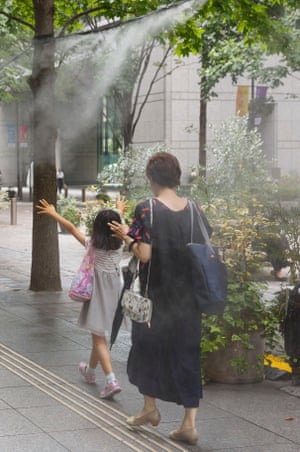
Humidity was a complicating factor, with one Istanbul resident saying it was hard even to breathe, even at night. Humid hot days in Washington DC, once rare from the first week of September, are now lasting well into the month, wrote Cara, contributing to insidious black mould with entire metro cars reeking of damp. Walk through Hong Kong for more than five minutes, said Ellison Tsang, “and it looks as though you’ve just passed through a shower with all your clothes on”. With 90% humidity, even 25C (77F) “feels like being brushed in salt-sweat soup,” echoed Eric Crawford from Beijing.
Air conditioning brought relief, but to a point that seemed drastically, even dangerously, at odds with ecology, said Tim Kelly in Naha, Japan. “Stores leave their front doors wide open, people enter and exit rooms without closing the door behind them – all the while blasting their air conditioning.” People even napped in their parked cars with the engines running.
Not only was this dependance on air conditioning damaging to the environment, but moving regularly between radically different climes causes temperature shock, said Kelly. “Their bodies lose the ability to cope with the natural environment.” Johanna MacGregor said summer colds were common in Tokyo because shops, restaurants and the subway were often too cool, “while places like schools or community halls often have no aircon whatsoever – it’s one or the other.”
It was in stark contrast to the picture painted by Patrycja Lickiewicz of Castalla in Alicante, Spain, as a society “in tacit compliance with nature”. There it is the norm to restrict activities to before 8.30am and after 8pm; and to drink water, dress appropriately, and stick to the shade at all other hours. “No matter the temperatures people always behave the same way,” said Lickiewicz. “We do not complain, we just follow the same simple routines. When common sense prevails we keep ourselves and the environment in check.”
"We should be using this heat to our advantage and convert all our power to solar source"
But adapting is not simply a case of being sun-smart, Lickiewicz conceded, when at least the oldest buildings in Castalla are built of stone, with internal air flow directed through courtyards and shutters – which manages heat without the need for air conditioning.
If cities are to cope with more extreme heat more frequently, there needs to be structural change across the board: building codes to ensure future housing stock is not only warm, but cool; infrastructure that can cope; and regulation to enforce safe behaviours. Harry May, in Fukuoka, Japan, wanted to see work shut down when the mercury climbs past 34C (“Think on that, the UK”); Monica Garcia-Galvan was in favour of introducing a water tax in Montreal to encourage people not to let taps run for minutes at a time (“if English people saw how Canadians wash dishes, they would faint”). Adina, in Timisoara, Romania, said authorities needed to enforce health and safety laws relating to working in unsafe temperatures: “We have them but no one respects them.” Alice Browning of Friedrichshafen, southern Germany, spoke for many with her desperate plea for more trees: “We really don’t want to be cooped up inside all day.”
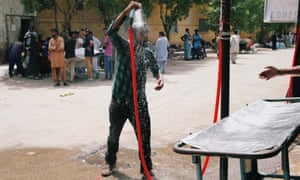
In many cities steps have already been taken. In Nantes, Patrick Brown said, boulevards cleared for cars were being redesigned to include plenty of green space, and art installations with water features had given people places in which to cool off in summer. The De Bastei centre operated a scheme in Nijmegen and elsewhere in the Netherlands where residents could swap tiles or stones from their garden for plants.
Others saw opportunities to be grasped by tackling the rising temperatures. David Fraire said nothing could be done to ease the issue of heat in Chandler, Arizona. “This is Phoenix, valley of the sun – it comes with the territory.” But it could be better harnessed: “We should be using this heat to our advantage and convert all our power to solar source.” Frank Holt suggested that Britain could build its new, post-Brexit identity through investment in renewables.
"It’s very much not a problem for the next generation – we need to be thinking about how we get to grips with it"
But even in amongst optimism there was a feeling of powerlessness, even fatalism. Washington DC residents would cope with the heat as they had done for decades, said Cara – but related issues, for example surrounding health problems and food insecurity, were a bigger unknown. “We’re already putting in more green, solar, or light-coloured roofs. We’re committed to keeping and increasing the tree canopy, too, to help lower temperatures.”
But without greater commitment to addressing the root causes from regional authorities – for example, by shutting down the coal-fired power plants along the Potomac – Cara continued: “there is very little we can do”. Charlie in Redding, California, urged that the US “stop with the knuckle dragging” and return to the Paris climate accord and “thinking people” at once – if it was not already too late. The day he wrote, it was nearly 43C (109F): “Think that life as we have known it forever is on a collision course with a destiny that’s not beneficial for mankind!”
Dr Adam Corner of Climate Outreach said adapting to climate change meant seeing its influence in every facet of life – not just the environment, and not just in high-profile periods of extreme weather. “It’s a really complex set of questions, but those tangible things are more relatable to people than ‘global temperatures are going to change by 2C’,” he said. “There are so many ways that climate change is with us now. It’s very much not a problem for the next generation – we need to be thinking about how we get to grips with it.”
The effects and implications of rising temperatures need to be considered by doctors, urban planners, architects; those working in business, transport, agriculture and food security. Yet even news stories about climate change were illustrated with photographs of polar bears and melting ice caps, or renderings of future cities. “It’s the human story of our generation, but you wouldn’t know it, from the way we visualise and present it. Where are the people in this?”
In Nabeul, said Ayari, they were mostly indoors, sheltering in the air conditioning. Traffic had become unbearable and it was too hot even to go to the beach. His twin sister has a respiratory condition exacerbated by the heat and had been advised to stay indoors: “The doctors say it’s like an allergy to the weather,” said Ayari. “People are actually getting scared of going out and being confronted by the sun. You have empty streets in the daytime and huge crowds at night.
“This heatwave we are witnessing is making me more and more concerned about our future in the city ... We have to talk more about the seriousness of this issue.”
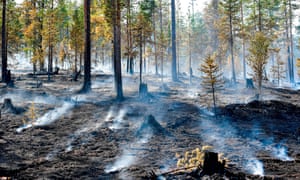
No comments:
Post a Comment